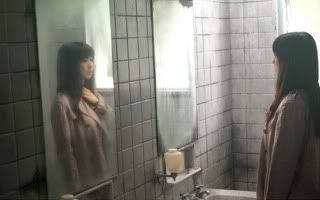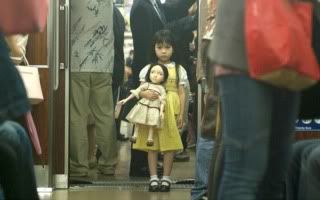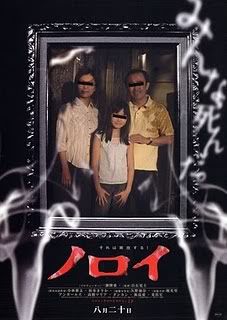
Whether it be automobiles, electronics, or horror films, the Japanese always manage to find a way to fine tune the hell out of a primarily Western innovation.
In NOROI, we have the fully realized state of what a horror mockumentary should look like and it joins [REC] and Paranormal Activity on the higher end of the genre.
The puzzling part of the equation is the director. I have to admit that I am completely confounded by the career of Kôji Shiraishi.
Kôji Shiraishi is the director of noteworthy cinematic disasters such as Kuchisake-Onna (Carved) and Ju-Rei; two films so legendary in their generic mediocrity that it is embarrassing. I certainly did not expect a film like this to come from a guy with that sort of track record.
I suppose NOROI is the metaphorical ray of sunshine on the dog's nose that represents the career of Mr. Shiraishi, although I have heard some good things about his other noteworthy entry into the horror mockumentary genre (2009's Occult) and the surreal Teke-Teke films.
Hmmm. If memory serves me, Teke-Teke is actually an urban legend about the onryō of a girl that was cut in half when she fell in the path of an oncoming train.
I may have track those movies down and review them for the blog but for the time being, let's stick with the task at hand.
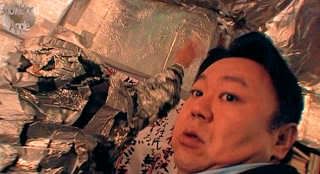
In NOROI, we have the fully realized state of what a horror mockumentary should look like and it joins [REC] and Paranormal Activity on the higher end of the genre.
The puzzling part of the equation is the director. I have to admit that I am completely confounded by the career of Kôji Shiraishi.
Kôji Shiraishi is the director of noteworthy cinematic disasters such as Kuchisake-Onna (Carved) and Ju-Rei; two films so legendary in their generic mediocrity that it is embarrassing. I certainly did not expect a film like this to come from a guy with that sort of track record.
I suppose NOROI is the metaphorical ray of sunshine on the dog's nose that represents the career of Mr. Shiraishi, although I have heard some good things about his other noteworthy entry into the horror mockumentary genre (2009's Occult) and the surreal Teke-Teke films.
Hmmm. If memory serves me, Teke-Teke is actually an urban legend about the onryō of a girl that was cut in half when she fell in the path of an oncoming train.
I may have track those movies down and review them for the blog but for the time being, let's stick with the task at hand.

Unlike most horror mockumentaries that use the "day in the life" format such as the wellspring of the genre known as The Blair Witch Project or Daniel Stamm’s ambitious but uneven offering, The Last Exorcism, NOROI has the look and feel of an actual video journal complete with an Unsolved Mysteries-style prologue which sets the tone for the dread to come as well as clips from various television programs exploring psychic phenomenon (apparently there is a mentalist on every street corner in Japan).
The video tape entitled NOROI as showcased in this movie represents the mea culpa of Masafumi Kobayashi (Jin Muraki), a journalist specializing in paranormal investigation.
NOROI's prologue informs us in no uncertain terms that enventually Kobayashi will meet with a mysterious and unfortunate fate, but this knowledge adds to the tension rather than taking away from it.
We know all the while that Kobayashi is living on borrowed time and this is somewhat saddening because Kobayashi really is a likeable and honorable sort of fellow.
Our man works tirelessly to put together the intricate pieces of a horrifying puzzle as he and his faithful cameraman try to find the links between a series of apparently unrelated events that could possibly have a connection to the ancient legend of an oni known as Kagutaba.
Kobayashi crosses paths with several interesting characters in his quest for truth including a clairvoyant television actress (Marika Matsumoto plays herelf apparently as a device to ground the storyline in "reality") and a batshit insane, tin foil wearing telepath named Mitsuo Hori (played ridiculously over the top by the scene stealing, Satoru Jitsunashi).
What starts out as a routine interview for Kobayashi suddenly becomes a missing persons case when Kobayashi learns that Kana Yano (played by the absolutely cherubic Rio Kanno of Dark Water fame), the psionically gifted daughter of a couple Kobayashi interviews in Tokyo, suddenly vanishes without a trace. There are also the customary J-Horror style random deaths including a mass suicide.
Most of the fatalities in NOROI occur off camera and are introduced by way of interviews and newspaper clippings as not to stray too far away from the mockumentary format.
Bit by bit, Kobayashi slowly begins to make sense of the enigma before him and our hearts become heavy. We are filled with remorse and trepidation because all the while, we realize that this is the last case that poor Kobayashi will work on.
His dedication to his journalistic principles and his relentless desire to explain the unexplainable will be his undoing.

The video tape entitled NOROI as showcased in this movie represents the mea culpa of Masafumi Kobayashi (Jin Muraki), a journalist specializing in paranormal investigation.
NOROI's prologue informs us in no uncertain terms that enventually Kobayashi will meet with a mysterious and unfortunate fate, but this knowledge adds to the tension rather than taking away from it.
We know all the while that Kobayashi is living on borrowed time and this is somewhat saddening because Kobayashi really is a likeable and honorable sort of fellow.
Our man works tirelessly to put together the intricate pieces of a horrifying puzzle as he and his faithful cameraman try to find the links between a series of apparently unrelated events that could possibly have a connection to the ancient legend of an oni known as Kagutaba.
Kobayashi crosses paths with several interesting characters in his quest for truth including a clairvoyant television actress (Marika Matsumoto plays herelf apparently as a device to ground the storyline in "reality") and a batshit insane, tin foil wearing telepath named Mitsuo Hori (played ridiculously over the top by the scene stealing, Satoru Jitsunashi).
What starts out as a routine interview for Kobayashi suddenly becomes a missing persons case when Kobayashi learns that Kana Yano (played by the absolutely cherubic Rio Kanno of Dark Water fame), the psionically gifted daughter of a couple Kobayashi interviews in Tokyo, suddenly vanishes without a trace. There are also the customary J-Horror style random deaths including a mass suicide.
Most of the fatalities in NOROI occur off camera and are introduced by way of interviews and newspaper clippings as not to stray too far away from the mockumentary format.
Bit by bit, Kobayashi slowly begins to make sense of the enigma before him and our hearts become heavy. We are filled with remorse and trepidation because all the while, we realize that this is the last case that poor Kobayashi will work on.
His dedication to his journalistic principles and his relentless desire to explain the unexplainable will be his undoing.

Simply put, NOROI is a brilliant film.
It is a welcomed return to the deliberate pacing that made RING the J-Horror epic it is. The viewer watches in absolute fascination and terror as events unfold before his eyes and what was once random suddenly becomes another brush stroke in a portrait of doom.
There is a bit of spoon feeding in NOROI that comes in the form of segments of the film where footage is rewound to point out details that may not have registered via first time casual observation. This deliberate practice sometimes causes NOROI to lose that aura of pseudo-authenticity that all horror mockumentaries try to build, but it does help the viewer manage the mountain of information contained in the plotline.

It is a welcomed return to the deliberate pacing that made RING the J-Horror epic it is. The viewer watches in absolute fascination and terror as events unfold before his eyes and what was once random suddenly becomes another brush stroke in a portrait of doom.
There is a bit of spoon feeding in NOROI that comes in the form of segments of the film where footage is rewound to point out details that may not have registered via first time casual observation. This deliberate practice sometimes causes NOROI to lose that aura of pseudo-authenticity that all horror mockumentaries try to build, but it does help the viewer manage the mountain of information contained in the plotline.

NOROI clocks in just shy of two hours and it is a very slow burn. Normally this works to the disadvantage of most movies but here, it actually helps out a great deal. As I said before, the forks in the road are numerous and it is hard to keep track of them as Kobayashi works all of the angles.
The viewer's patience is ultimately rewarded with the subtle and ingenious "Aha!" moments near the end of the film where something finally clicks and ends mend themselves together. Unfortunately for Kobayashi, every answered question leads him further along the path to oblivion.
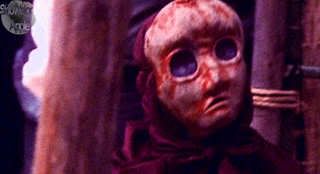
The viewer's patience is ultimately rewarded with the subtle and ingenious "Aha!" moments near the end of the film where something finally clicks and ends mend themselves together. Unfortunately for Kobayashi, every answered question leads him further along the path to oblivion.

As with most Japanese films, some of the cultural insertions will drive you nuts. Americans simply are not disposed towards presuppositions of the supernatural.
NOROI makes it seem like every third member of the Japanese population is a damned onmyōji or at the very least, is capable of bending spoons or something. Accepting the events, concepts, and characters which support NOROI's central theme concerning the invssion of the physical by the metaphysical calls for a heavy dose of disbelief suspension.
I suppose that is why the mockumentary format works so well for NOROI. The camera provides the audience with its window to reality so if something is going on in front of the camera, it has to be true therefore it is relatively easy to accept what is placed before you.
Besides, believing in demons isn't the hazardous part. The danger comes when demons believe in us.
It is my sincere hope that NOROI eventually finds its way to a wider release here in North America. I plan to add it to my DVD shelf as soon as I see it in my local Asian film specialty store at Chesterfield Town Center.
I spend so much money at the beloved Foreign Flix that it is unbelievable.
NOROI makes it seem like every third member of the Japanese population is a damned onmyōji or at the very least, is capable of bending spoons or something. Accepting the events, concepts, and characters which support NOROI's central theme concerning the invssion of the physical by the metaphysical calls for a heavy dose of disbelief suspension.
I suppose that is why the mockumentary format works so well for NOROI. The camera provides the audience with its window to reality so if something is going on in front of the camera, it has to be true therefore it is relatively easy to accept what is placed before you.
Besides, believing in demons isn't the hazardous part. The danger comes when demons believe in us.
It is my sincere hope that NOROI eventually finds its way to a wider release here in North America. I plan to add it to my DVD shelf as soon as I see it in my local Asian film specialty store at Chesterfield Town Center.
I spend so much money at the beloved Foreign Flix that it is unbelievable.



